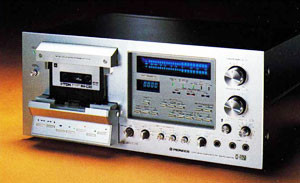The Pioneer CT-F1250, a stereo cassette deck that graced audiophile listening rooms from 1979 to 1981, stands as a testament to Pioneer’s engineering prowess and dedication to sonic excellence. This three-head, dual-motor marvel wasn’t just another cassette deck; it was a statement, designed for discerning ears and those who demanded the very best in tape recording and playback. Capable of handling metal tapes, the CT-F1250 pushed the boundaries of cassette technology, delivering a listening experience that rivaled open-reel systems of the era.
 Pioneer CT-F1250 Stereo Cassette Deck Front View
Pioneer CT-F1250 Stereo Cassette Deck Front View
At the heart of the Pioneer CT-F1250 lies a sophisticated mechanism built for precision and longevity. The incorporation of a quartz PLL direct drive motor for the capstan ensured unwavering tape speed stability, minimizing wow and flutter – critical for accurate sound reproduction. A separate DC high-torque motor managed fast forward and rewind functions with speed and efficiency, showcasing the deck’s robust engineering. Pioneer’s commitment to advanced head technology is evident in the Uni-Crystal Ferrite recording/playback head. This innovative head design contributed to exceptional frequency response and durability, allowing for extended use without compromising sound quality. Complementing this was a dedicated small-window erasing head, ensuring clean and complete erasure for pristine recordings every time.
The Pioneer CT-F1250 wasn’t just about impressive internal components; it was also about user-friendly features that catered to the audiophile’s need for control and precision. The inclusion of Dolby noise reduction significantly lowered tape hiss, enhancing the dynamic range and clarity of recordings, especially with quieter passages. Furthermore, the LED-aided equalization tuning system empowered users to fine-tune the deck’s settings to perfectly match different tape formulations. This level of adjustability ensured optimal recording and playback performance across a wide spectrum of tape types, including Type I (Normal), FeCr, CrO2 (Chrome), and the advanced Metal tapes.
Delving into the specifications reveals the technical sophistication of the Pioneer CT-F1250:
Specifications at a Glance:
- Type: 3-head, single compact cassette deck
- Track System: 4-track, 2-channel stereo
- Tape Speed: 4.75 cm/s
- Heads: 1 x combination record/playback, 1 x erase
- Motor: 1 x capstan (Quartz PLL Direct Drive), 1 x reel (DC High Torque)
- Tape Type Compatibility: Type I, FeCr, CrO2, Metal
- Noise Reduction: Dolby B
- Frequency Response: 20Hz to 20kHz (Metal tape)
- Signal to Noise Ratio: 69dB (Dolby B)
- Wow and Flutter: 0.03%
- Total Harmonic Distortion: 1.0%
- Input Sensitivity: 60mV (line), 0.3mV (mic)
- Output Level: 0.45V (line)
- Semiconductors: A complex array of 139 transistors, 125 diodes, and 22 ICs
- Dimensions: 420 x 187 x 369.5mm
- Weight: 10.9kg (24 lbs)
- Year of Manufacture: 1980
User reviews consistently praise the Pioneer CT-F1250 for its exceptional sound quality and user experience. Owners highlight its superior sonic performance, particularly its imaging specificity, making it a pleasure to listen to. The deck’s robust build quality and elegant aesthetics are also frequently lauded, with many considering it one of the most visually appealing cassette decks ever made. The blue vacuum fluorescent VU meters and the open transport mechanism add to its vintage charm and operational appeal. The EQ-LB tuning system receives positive feedback for its ease of use and effectiveness in achieving optimal recordings.
However, like any vintage piece of audio equipment, the Pioneer CT-F1250 may require servicing due to its age. Belt replacement and motor maintenance are common needs for decks of this era. While parts can be increasingly challenging to source, the enduring popularity of the CT-F1250 within the audiophile community means there is still a dedicated support network and resources available for restoration and maintenance.
In conclusion, the Pioneer CT-F1250 is more than just a vintage cassette deck; it’s a piece of audio history. Its advanced technology, robust construction, and exceptional sound quality solidify its place as a highly sought-after component for collectors and audiophiles alike. For those seeking the warmth and depth of analog sound with the precision engineering of the late 1970s, the Pioneer CT-F1250 remains a benchmark in cassette deck design and a testament to Pioneer’s legacy in high-fidelity audio.
